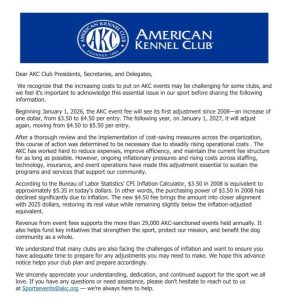Field Trials US
Vol. XIV, Week 32 Aug 11, 2025
Week 32
Down East Hunting Retriever Club (DEHRC) - see full results
Hennepin County Amateur Retriever Club (HCARC) - see full results
Hinckley Retriever Club (HnkRC) - see full results
Manitowoc County Kennel Club (MCKC) - see full results
Maumee Valley Retriever Club (MauValRC) - see full results
Minot Retriever Club (MinotRC) - see full results
Professional Retriever Trainers Association (PRTA) - see full results
Milestones
FC-AFC Troublesome Fowl Delivery (BLM, 8.5 yo) owned by Dale Nevitt has earned 50 Points
FC Zipline's Jameson O'grady (BLM, 6.4 yo) owned by Karen Mcfadden, William McFadden has earned 26 Points
Open Points:
FC Zipline's Jameson O'grady (BLM, 6.4 yo) owned by Karen Mcfadden, William McFadden has earned 26 Points
Amateur Points:
FC-AFC Clarence Rutherford (BLM, 5.3 yo) owned by Jim Horneck has earned 30.5 Points
It's a sweep!
Black River Retrievers
Alan Pleasant, Open Stake, Down East Hunting Retriever Club
Regenerative Plasma Therapy Expands to U.S. Vet Practices
From Pawlicy Advisor
Endoret PRGF (Plasma Rich in Growth Factors), a regenerative therapy long used in human medicine, is now available to U.S. veterinary practices. Using a patient’s own platelet-rich plasma, the treatment reduces inflammation, promotes healing, and improves mobility in cats, dogs, and horses. Developed by BTI Biotechnology Institute in Spain, the system is backed by 300+ studies and has been used in over 1 million cases worldwide, DVM360 reported.
Distributed in the U.S. by Endurance Technologies, the therapy is being adopted by clinics and rehab centers seeking affordable, evidence-based regenerative options. Early reports show faster recovery and improved outcomes, with plans to expand access through training and veterinary partnerships.
Identifying the Error
By Lisa Laufer
I’ve been training with Petra Ford for a while now, and one thing she talks about a lot is identifying the type of error - figuring out if it’s an attention issue, a pressure response, or a lack of understanding. She brought it up again in a recent episode of her Canine Connections podcast on fundamentals.
It sounds so easy… and it probably is for someone who’s been training for years. But I forget stuff. When an error happens, I’m not always sure what I’m supposed to do. I can’t always remember how I originally trained the skill, which makes it hard to go back to the right fundamentals. All those details just clutter up my brain, confuse me, and add pressure!
So I started writing things down on 3x5 cards. I made a few general cards to remind me what to look for when an error happens so I can respond appropriately. When a specific error shows up, I make a new card for it, look up how I trained it if I need to, and write down the key fundamentals I want to revisit.
It’s already making a big difference. My brain feels less cluttered, and because they’re just 3x5 cards, I can add, update, or toss them anytime. I don’t feel like I have to solve everything all at once. I can also put them away and stop obsessing about having every possible error and solution laid out ahead of time.
The cards tuck easily into my training bag, so they’re always there when I need them.






